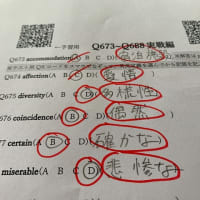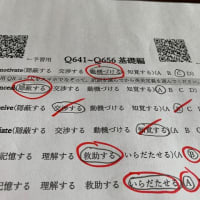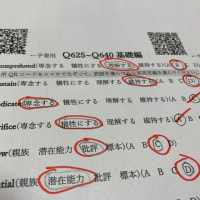日本人が英語を学習するにあたって、和訳は理解度を確認する有効な手段です。ただ、和訳には時間がかかり日本語語の思考回路を起動させてしまうという大きな欠点があります。基礎を習得した後は和訳なしでも英語力を伸ばす方法があります。以下にお示しするのは、和訳せずに理解度を確認できる長文整序問題です。
第6問改題
While I was growing up in our small town, Rosemont, I always thought of my neighbor, Mr. Peal, as a strange and somewhat frightening old man. He was always yelling at me and my playmates ①(from / stay / to / away) his yard and his old truck. My parents never said much about Mr. Peal and only told me ②(him / leave / alone / to), so I never had any reason to believe he was anything more than an unpleasant old man.
But sometimes, at times and places we least expect, we learn something new about people that changes how we look at them. Such a thing happened to me last year at my university, a hundred miles from home.
One day I was in the cafeteria talking with a classmate about my hometown. Suddenly a student who was ③(next / sitting / interrupted / to us) and said, “Did you say you come from Rosemont? Do you know an old man named Peal there? He drove an old blue truck.”
“ Why, yes,” I answered. “ He’s my neighbor. Do you know him?”
“I do! What a coincidence!” said the student and he began to tell me a story. He told me that he lived in Sunnydale, where the university is, and that one day seven years ago he, his mother, and his little sister ④(a day / to / decided / spend) in the mountains near my hometown. “We had to take a train to Rosemont early in the morning, and then a bus from there into the mountains,” he said.
He said that he and his sister began using rocks to make a small pool in a mountain stream. “We wanted to catch baby fish and collect them in the pool so that the three of us could watch them swim around for a while before we ⑤(escape / them / back into / let) the river.”
He was ⑥(one / the rocks / arranging / of) in the wall when suddenly his sister accidentally dropped a large rock right on top of his left hand. It cut his fingers to the bone and made a terrible wound. “It hurt so much, and it looked awful,” he said. “Mom wrapped my hand in a towel and told us we had to find a doctor.”
But the bus back into town was not due for another four hours. The three decided they would have to walk down the road back to town. However, that too, would take more than an hour. “My mother kept ⑦(me / telling / brave / to be), but I could tell that she was really worried. We were all scared.”
Just then, a small blue truck came up the road in front of them.
“Mom started waving and yelling, and the truck stopped. She ⑧(happened / what / explained / had) and asked the driver, an old man, if he would take us into town to see a doctor.”
But the man told her that the doctor was out of town and that the only other doctor in the area was another thirty miles away on the other side of Rosemont. “He told us to hop in and that there was some ice for my hand in a bucket in the truck.”
The student continued his story, telling me that he could not remember much about the trip to the doctor. However, when he finally walked out of the doctor’s room with his fingers bandaged, Mr. Peal was sitting in the waiting room with his mother and sister.
“He said he would ⑨(back / drive / to / us) Rosemont so we could catch the last train home. On the way back he told us that he had no grandchildren, but that his next-door neighbors has a daughter named Sarah around my age, so he knew how Mom must have felt. You must be Sarah, I guess. When you see Mr. Peal again, tell ⑩(that / him / majoring / I’m) in music─guitar! My hand is perfectly fine.”
“I’ll do that,” I answered.
Our university is large, and I never again met the student who had told me this story. But I did see Mr. Peal again. I see him with new eyes now, and I am glad I have ⑪(him / neighbor / a / like).
解答)①(to stay away from) ②(to leave him alone) ③(sitting next to us interrupted) ④(decided to spend a day) ⑤(let them escape back into)⑥(arranging one of the rocks) ⑦(telling me to be brave)⑧(explained what had happened) ⑨(drive us back to) ⑩(him that I’m majoring) ⑪(a neighbor like him)
※わからない単語が多ければ辞書を使って解いても力はつきます。ただし試験本番で辞書は使えません。大学入学共通テスト 時間内で解ける力がつく英英直読英単語・熟語は、上記の長文中で固有名詞以外はほとんどカバーしています。
共通テスト英語ではリーディングの総語彙数が増え、リスニングの比重が高く なり一回しか読まれない部分が登場します。出題者側が英語を英語で理解する能 力を求めているのは明らかです。対策に は、キーワードを英英定義で理解して 普 段から英英思考に親しみ英語を英語で理解する英語頭を鍛えるのがきわめて 有効 です。
大学入学共通テスト 時間内で解ける力がつく英英直読英単語・熟語は、800の例文と800の英英定義文の中に2000語以上の共通テス トのキーワードになる英単語・熟語を組み込み、以下のような練習問題にしまし た。
左ページ
①~④の単語に合致する(A)~(D)の英英定義を例文を参照して選んでください。
(25)
①recover【rikʌ'vər】(Ex:I still haven't *recovered from the cold I caught last week.)(2005センター)(097)
②burn【bə'ːrn】(Ex:When fossil fuels are *burned, they release carbon dioxide.)(098)
③expect【ikspékt】(Ex:Never did I *expect to see him in such a place. )(099)
④preserve【prizə'ːrv】(Ex:What can be used to *preserve food?)(100)
(A)to think that something will happen
(B)to get better after an illness or an injury
(C)to keep something in good condition
(D)to damage something with fire
(26)
①gather【gǽðər】(Ex:*Gathering seafood by hand is very simple.)(101)
②avoid【əvɔ'id】(Ex:Which fruits should be *avoided for weight loss?)(102)
③hide【háid】(Ex:Where can I *hide my secret diary in my room?)(103)
④decide【disáid】(Ex:She *decided to quit her job.)(104)
(A)to keep away from someone or something
(B)to make a choice about something
(C)to bring many things together
(D)to keep something in a place where it cannot easily be found
右ページ
(25)
①recover:回復する(Ex:私はまだ先週ひいた風邪から回復していない。)
②burn:燃やす(Ex:化石燃料が燃やされるとき、二酸化炭素を放出する。)
③expect:予期する(Ex:彼とそんな場所で会うなんて全然予期していなかった。)
④preserve:保存する(Ex:食べ物を保存するのに何が使えるだろうか。)
(A)何かが起こると思うこと
(B)病気あるいは怪我の後で良くなること
(C)何かを良い状態に保つこと
(D)何かを火で傷つけること
①(B)②(D)③(A)④(C)
(26)
①gather:集める(Ex:シーフードを手で集めることはとても簡単だ。)
②avoid:避ける(Ex:体重を減らすためにどんな食べ物を避けるべきだろう。)
③hide:隠す(Ex:部屋のどこに秘密の日記を隠せるだろう。)
④decide:決める(Ex:彼女は仕事をやめることに決めた。)
(A)誰かあるいは何かから離れていること
(B)何かについて選択をすること
(C)多くのものを一緒にすること
(D)何かを簡単には見つからない場所に保つこと
①(C)②(A)③(D)④(B)
左ページ
(27)
①remove【rimúːv】(Ex:Chewing gum and yawning are effective ways to remove water from your ears.)(105)
②hate【héit】(Ex:If your child *hates doing homework, you're not alone.)(106)
③illustrate【íləstrèit】(Ex:This picture illustrates a method of protection utilized by many animals.)(107)(2009センター)
④lead【líːd】(Ex:The guide led us to the museum.)(108)
(A)to dislike someone or something very much
(B)to make something easy to understand by giving examples
(C)to take someone somewhere, usually by walking in front of them
(D)to take something away from a place
(28)
①prevent【privént】(Ex:Fire doors help *prevent fires from spreading through a building. )(109)
②invent【invént】(Ex:Who *invented the telephone? )(110)
③bark【bɑ'ːrk】(Ex:*Barking dogs seldom bite.)(111)
④achieve【ətʃíːv】(Ex:Nothing can be *achieved without effort.)(112)
(A)to create something that has never been made before
(B)to stop something from happening
(C)to succeed in doing something
(D)to make a short loud sound
右ページ
(27)
①remove:取り除く(Ex:ガムを噛むこととあくびすることは耳から水を取り除く効果的な方法だ。)
②hate:憎む(Ex:もし子どもが宿題をすることを憎んでも、あなたは一人ではない。)
③illustrate:例示する(Ex:この絵は多くの動物に使われる防御方法を例示する。)
④lead:先導する(Ex:ガイドは私たちを博物館に導いた。)
(A)誰かあるいは何かをとても嫌うこと
(B)例を示すことにより何かを理解しやすくすること
(C)普通は前を歩くことにより誰かをどこかに連れていくこと
(D)何かを場所から取り去ること
①(D)②(A)③(B)④(C)
(28)
①prevent:防ぐ(Ex:防火扉は火が建物中に広がるのを防ぐ助けになる。)
②invent:発明する(Ex:誰が電話を発明したのだろうか。)
③bark:吠える(Ex:吼える犬はめったに噛まない。)
④achieve:達成する(Ex:何事も努力なしには達成できない。)
(A)以前は作られていなかったものを作り出すこと
(B)何かが起きるのを止めること
(C)何かをするのに成功すること
(D)短く大きな音を出すこと
①(B)②(A)③(D)④(C)
左ページ
定義文を読んでから例文を完成してください。音読するとさらに効果的です。
(097)I still haven't rec------- from the cold I caught last week.
【to get better after an illness or an injury】
(098)When fossil fuels are bur-------, they release carbon dioxide.
【to damage something with fire】
(099)Never did I exp------- to see him in such a place.
【to think that something will happen】
(100)What can be used to pre------- food?
【to keep something in good condition】
(101)Gat------- seafood by hand is very simple.
【to bring many things together】
(102)Which fruits should be avo------- for weight loss?
【to keep away from someone or something】
(103)Where can I hid------- my secret diary in my room?
【to keep something in a place where it cannot easily be found】
(104)She dec------- to quit her job.
【to make a choice about something】
(097)recovered (098)burned (099)expect (100) preserve
(101)Gathering (102)avoided (103)hide (104)decided
右ページ
(105)Chewing gum and yawning are effective ways to rem------- water from your ears.
【to take something away from a place】
(106)If your child hat------- doing homework, you're not alone.
【to dislike someone or something very much】
(107)This picture ill------- a method of protection utilized by many animals.
【to make something easy to understand by giving examples】
(108)The guide le------- us to the museum.
【to take someone somewhere, usually by walking in front of them】
(109)Fire doors help pre------- fires from spreading through a building.
【to stop something from happening】
(110)Who inv------- the telephone?
【to create something that has never been made before】
(111)Bar------- dogs seldom bite.
【to make a short loud sound】
(112)Nothing can be ach------- without effort.
【to succeed in doing something】
(105)remove (106)hates (107)illustrates (108)led
(109)prevented (110) invented (111)Barking (112)achieved
※共通テスト英語キーワードを含む英英定義文と例文で上記のトレーニングを50サイクル行いますので、どれほど力が付くかご想像いただけると思います。
※試用頂いた塾からは以下のような好評を頂いています。
早速今週やらせてみたんですが、いやー反応が良かったですよ!
最初は普通に実施するのではまずいかなと思っていたんです。
生徒からしてみたら「急にどうしてこれを?」となるでしょうから。
しかし、意図を説明する文面を作る暇がなくて、結局、いただいたサンプルをそのままコピーしてやらせてみたのでした。
まだ全員に聞きまわれてはいませんが、
A高3年のある女子は、
「これ楽しい!またやりたい」と笑顔で答えていましたし、
現在、センター過去問で8割ぐらい取るB高3年の男子も同じことを言ってました。
お前ももっとやってみたいと思うか?と聞くと「はい、やってみたいです!」と。
いやーなんとも制作者冥利に尽きる言葉ですよね。(注:私が作ったわけではありませんが…)
私もいくつか問題を作るのでわかるのですが、もし「またやりたい」なんて生徒から言われたら、私だったらうれしくて涙が出ますよ。
正直普通の高校生にこれほど受け入れられるとは思いませんでした…(失礼)
第6問改題
While I was growing up in our small town, Rosemont, I always thought of my neighbor, Mr. Peal, as a strange and somewhat frightening old man. He was always yelling at me and my playmates ①(from / stay / to / away) his yard and his old truck. My parents never said much about Mr. Peal and only told me ②(him / leave / alone / to), so I never had any reason to believe he was anything more than an unpleasant old man.
But sometimes, at times and places we least expect, we learn something new about people that changes how we look at them. Such a thing happened to me last year at my university, a hundred miles from home.
One day I was in the cafeteria talking with a classmate about my hometown. Suddenly a student who was ③(next / sitting / interrupted / to us) and said, “Did you say you come from Rosemont? Do you know an old man named Peal there? He drove an old blue truck.”
“ Why, yes,” I answered. “ He’s my neighbor. Do you know him?”
“I do! What a coincidence!” said the student and he began to tell me a story. He told me that he lived in Sunnydale, where the university is, and that one day seven years ago he, his mother, and his little sister ④(a day / to / decided / spend) in the mountains near my hometown. “We had to take a train to Rosemont early in the morning, and then a bus from there into the mountains,” he said.
He said that he and his sister began using rocks to make a small pool in a mountain stream. “We wanted to catch baby fish and collect them in the pool so that the three of us could watch them swim around for a while before we ⑤(escape / them / back into / let) the river.”
He was ⑥(one / the rocks / arranging / of) in the wall when suddenly his sister accidentally dropped a large rock right on top of his left hand. It cut his fingers to the bone and made a terrible wound. “It hurt so much, and it looked awful,” he said. “Mom wrapped my hand in a towel and told us we had to find a doctor.”
But the bus back into town was not due for another four hours. The three decided they would have to walk down the road back to town. However, that too, would take more than an hour. “My mother kept ⑦(me / telling / brave / to be), but I could tell that she was really worried. We were all scared.”
Just then, a small blue truck came up the road in front of them.
“Mom started waving and yelling, and the truck stopped. She ⑧(happened / what / explained / had) and asked the driver, an old man, if he would take us into town to see a doctor.”
But the man told her that the doctor was out of town and that the only other doctor in the area was another thirty miles away on the other side of Rosemont. “He told us to hop in and that there was some ice for my hand in a bucket in the truck.”
The student continued his story, telling me that he could not remember much about the trip to the doctor. However, when he finally walked out of the doctor’s room with his fingers bandaged, Mr. Peal was sitting in the waiting room with his mother and sister.
“He said he would ⑨(back / drive / to / us) Rosemont so we could catch the last train home. On the way back he told us that he had no grandchildren, but that his next-door neighbors has a daughter named Sarah around my age, so he knew how Mom must have felt. You must be Sarah, I guess. When you see Mr. Peal again, tell ⑩(that / him / majoring / I’m) in music─guitar! My hand is perfectly fine.”
“I’ll do that,” I answered.
Our university is large, and I never again met the student who had told me this story. But I did see Mr. Peal again. I see him with new eyes now, and I am glad I have ⑪(him / neighbor / a / like).
解答)①(to stay away from) ②(to leave him alone) ③(sitting next to us interrupted) ④(decided to spend a day) ⑤(let them escape back into)⑥(arranging one of the rocks) ⑦(telling me to be brave)⑧(explained what had happened) ⑨(drive us back to) ⑩(him that I’m majoring) ⑪(a neighbor like him)
※わからない単語が多ければ辞書を使って解いても力はつきます。ただし試験本番で辞書は使えません。大学入学共通テスト 時間内で解ける力がつく英英直読英単語・熟語は、上記の長文中で固有名詞以外はほとんどカバーしています。
共通テスト英語ではリーディングの総語彙数が増え、リスニングの比重が高く なり一回しか読まれない部分が登場します。出題者側が英語を英語で理解する能 力を求めているのは明らかです。対策に は、キーワードを英英定義で理解して 普 段から英英思考に親しみ英語を英語で理解する英語頭を鍛えるのがきわめて 有効 です。
大学入学共通テスト 時間内で解ける力がつく英英直読英単語・熟語は、800の例文と800の英英定義文の中に2000語以上の共通テス トのキーワードになる英単語・熟語を組み込み、以下のような練習問題にしまし た。
左ページ
①~④の単語に合致する(A)~(D)の英英定義を例文を参照して選んでください。
(25)
①recover【rikʌ'vər】(Ex:I still haven't *recovered from the cold I caught last week.)(2005センター)(097)
②burn【bə'ːrn】(Ex:When fossil fuels are *burned, they release carbon dioxide.)(098)
③expect【ikspékt】(Ex:Never did I *expect to see him in such a place. )(099)
④preserve【prizə'ːrv】(Ex:What can be used to *preserve food?)(100)
(A)to think that something will happen
(B)to get better after an illness or an injury
(C)to keep something in good condition
(D)to damage something with fire
(26)
①gather【gǽðər】(Ex:*Gathering seafood by hand is very simple.)(101)
②avoid【əvɔ'id】(Ex:Which fruits should be *avoided for weight loss?)(102)
③hide【háid】(Ex:Where can I *hide my secret diary in my room?)(103)
④decide【disáid】(Ex:She *decided to quit her job.)(104)
(A)to keep away from someone or something
(B)to make a choice about something
(C)to bring many things together
(D)to keep something in a place where it cannot easily be found
右ページ
(25)
①recover:回復する(Ex:私はまだ先週ひいた風邪から回復していない。)
②burn:燃やす(Ex:化石燃料が燃やされるとき、二酸化炭素を放出する。)
③expect:予期する(Ex:彼とそんな場所で会うなんて全然予期していなかった。)
④preserve:保存する(Ex:食べ物を保存するのに何が使えるだろうか。)
(A)何かが起こると思うこと
(B)病気あるいは怪我の後で良くなること
(C)何かを良い状態に保つこと
(D)何かを火で傷つけること
①(B)②(D)③(A)④(C)
(26)
①gather:集める(Ex:シーフードを手で集めることはとても簡単だ。)
②avoid:避ける(Ex:体重を減らすためにどんな食べ物を避けるべきだろう。)
③hide:隠す(Ex:部屋のどこに秘密の日記を隠せるだろう。)
④decide:決める(Ex:彼女は仕事をやめることに決めた。)
(A)誰かあるいは何かから離れていること
(B)何かについて選択をすること
(C)多くのものを一緒にすること
(D)何かを簡単には見つからない場所に保つこと
①(C)②(A)③(D)④(B)
左ページ
(27)
①remove【rimúːv】(Ex:Chewing gum and yawning are effective ways to remove water from your ears.)(105)
②hate【héit】(Ex:If your child *hates doing homework, you're not alone.)(106)
③illustrate【íləstrèit】(Ex:This picture illustrates a method of protection utilized by many animals.)(107)(2009センター)
④lead【líːd】(Ex:The guide led us to the museum.)(108)
(A)to dislike someone or something very much
(B)to make something easy to understand by giving examples
(C)to take someone somewhere, usually by walking in front of them
(D)to take something away from a place
(28)
①prevent【privént】(Ex:Fire doors help *prevent fires from spreading through a building. )(109)
②invent【invént】(Ex:Who *invented the telephone? )(110)
③bark【bɑ'ːrk】(Ex:*Barking dogs seldom bite.)(111)
④achieve【ətʃíːv】(Ex:Nothing can be *achieved without effort.)(112)
(A)to create something that has never been made before
(B)to stop something from happening
(C)to succeed in doing something
(D)to make a short loud sound
右ページ
(27)
①remove:取り除く(Ex:ガムを噛むこととあくびすることは耳から水を取り除く効果的な方法だ。)
②hate:憎む(Ex:もし子どもが宿題をすることを憎んでも、あなたは一人ではない。)
③illustrate:例示する(Ex:この絵は多くの動物に使われる防御方法を例示する。)
④lead:先導する(Ex:ガイドは私たちを博物館に導いた。)
(A)誰かあるいは何かをとても嫌うこと
(B)例を示すことにより何かを理解しやすくすること
(C)普通は前を歩くことにより誰かをどこかに連れていくこと
(D)何かを場所から取り去ること
①(D)②(A)③(B)④(C)
(28)
①prevent:防ぐ(Ex:防火扉は火が建物中に広がるのを防ぐ助けになる。)
②invent:発明する(Ex:誰が電話を発明したのだろうか。)
③bark:吠える(Ex:吼える犬はめったに噛まない。)
④achieve:達成する(Ex:何事も努力なしには達成できない。)
(A)以前は作られていなかったものを作り出すこと
(B)何かが起きるのを止めること
(C)何かをするのに成功すること
(D)短く大きな音を出すこと
①(B)②(A)③(D)④(C)
左ページ
定義文を読んでから例文を完成してください。音読するとさらに効果的です。
(097)I still haven't rec------- from the cold I caught last week.
【to get better after an illness or an injury】
(098)When fossil fuels are bur-------, they release carbon dioxide.
【to damage something with fire】
(099)Never did I exp------- to see him in such a place.
【to think that something will happen】
(100)What can be used to pre------- food?
【to keep something in good condition】
(101)Gat------- seafood by hand is very simple.
【to bring many things together】
(102)Which fruits should be avo------- for weight loss?
【to keep away from someone or something】
(103)Where can I hid------- my secret diary in my room?
【to keep something in a place where it cannot easily be found】
(104)She dec------- to quit her job.
【to make a choice about something】
(097)recovered (098)burned (099)expect (100) preserve
(101)Gathering (102)avoided (103)hide (104)decided
右ページ
(105)Chewing gum and yawning are effective ways to rem------- water from your ears.
【to take something away from a place】
(106)If your child hat------- doing homework, you're not alone.
【to dislike someone or something very much】
(107)This picture ill------- a method of protection utilized by many animals.
【to make something easy to understand by giving examples】
(108)The guide le------- us to the museum.
【to take someone somewhere, usually by walking in front of them】
(109)Fire doors help pre------- fires from spreading through a building.
【to stop something from happening】
(110)Who inv------- the telephone?
【to create something that has never been made before】
(111)Bar------- dogs seldom bite.
【to make a short loud sound】
(112)Nothing can be ach------- without effort.
【to succeed in doing something】
(105)remove (106)hates (107)illustrates (108)led
(109)prevented (110) invented (111)Barking (112)achieved
※共通テスト英語キーワードを含む英英定義文と例文で上記のトレーニングを50サイクル行いますので、どれほど力が付くかご想像いただけると思います。
※試用頂いた塾からは以下のような好評を頂いています。
早速今週やらせてみたんですが、いやー反応が良かったですよ!
最初は普通に実施するのではまずいかなと思っていたんです。
生徒からしてみたら「急にどうしてこれを?」となるでしょうから。
しかし、意図を説明する文面を作る暇がなくて、結局、いただいたサンプルをそのままコピーしてやらせてみたのでした。
まだ全員に聞きまわれてはいませんが、
A高3年のある女子は、
「これ楽しい!またやりたい」と笑顔で答えていましたし、
現在、センター過去問で8割ぐらい取るB高3年の男子も同じことを言ってました。
お前ももっとやってみたいと思うか?と聞くと「はい、やってみたいです!」と。
いやーなんとも制作者冥利に尽きる言葉ですよね。(注:私が作ったわけではありませんが…)
私もいくつか問題を作るのでわかるのですが、もし「またやりたい」なんて生徒から言われたら、私だったらうれしくて涙が出ますよ。
正直普通の高校生にこれほど受け入れられるとは思いませんでした…(失礼)






















※コメント投稿者のブログIDはブログ作成者のみに通知されます